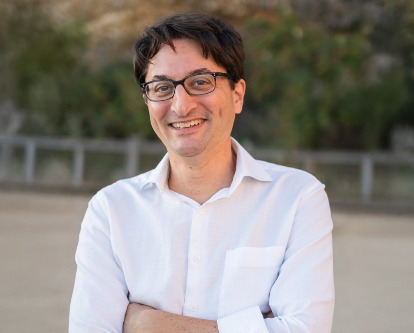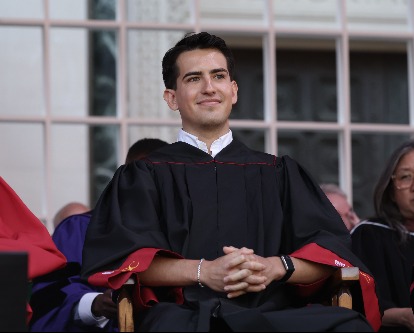 Robert Groag, a wealth management professional with TIAA, stood officiously behind an information booth in the middle of McCarthy Quad at the first annual Financial Literacy Festival, held Tuesday, April 5. “We’re here to answer any question anybody has about finance, personal or otherwise,” he said. “I’ve been amazed at the questions we’re hearing. They’re great.”
Robert Groag, a wealth management professional with TIAA, stood officiously behind an information booth in the middle of McCarthy Quad at the first annual Financial Literacy Festival, held Tuesday, April 5. “We’re here to answer any question anybody has about finance, personal or otherwise,” he said. “I’ve been amazed at the questions we’re hearing. They’re great.”
They ran the gamut, he said. Accounting. Retirement. Fintech and financial aid. “A dance major had questions about the CFD (Certified Financial Planner) designation and what it entails.”
Call it mission success. The festival, hosted by USC Marshall but with the backing and participation of University of Southern California investment offices and senior leaders, was created specifically to create a safe space for members of the USC community to bring questions and learn about finance.
“The world of finance can appear intimidating, but everyone needs to understand how it works,” said Marshall Dean Geoff Garrett, who welcomed festival attendees. “By demystifying the complexity of finance into common sense, our Financial Literacy Festival is a big step in the right direction.”
Held on a warm spring day on McCarthy Quad, the Financial Literacy Festival was a festival in every sense: a main stage. Food trucks. Games. Photo walls. Information booths on everything from financial aid to investing for women to trusts and retirement information.
The idea for a “festival” originated with a professor of finance, more accustomed to teaching her students the complex intricacies of corporate finance. Suh-Pyng Ku, vice dean for graduate programs and professor of clinical finance and business economics, said she wanted to create a space where everyone could ask questions and learn about basic finance.
“Financial literacy enables the mindsets and technical skills in order to make informed decisions that involve money, such as budgeting, saving, borrowing, investing, and raising capital for business,” said Ku. “These are life skills that all members of our USC community may benefit from.
“The goal is to spur interest in financial knowledge to help the greater community to become comfortable with the language of finance, ask questions, and seek answers,” she said.
The concept worked.
“This was very well put together,” said Jeremiah Young MBA ’22. “The presence of being in an open area, with food and speakers, it’s really welcoming. And the topics are what people are actually talking about.”
Start Investing Now
Three panel discussions, each with alumni experts, examined a different element of finance and planning, including how to determine value, how to think about crypto, and important first steps in investing after gaining employment. Indeed, While the main theme of the festival was learning about finance, the secondary theme was surely “Get started now.”
In a panel moderated by Priya Bhikha MBA ’21 titled, “I Got a Job, Now What?” panelists Nadia Allaudin ’98 and Heliane Steden ’86 enjoined listeners that starting early was the most important money move they could make.
“People should start when they can start, and then grow as they move forward in their careers,” said Allaudin, managing director & wealth management advisor at Merrill Lynch. “But it’s most important to start.”
“In the beginning, when you leave here, it’s not always easy to figure out what you want to do,” said Steden, a USC Trustee and retired managing director at Merrill Lynch. “Your interests will evolve. Pay attention. You learn something from every step of your journey.”
How to Think about Money
Morgan Housel, author of “The Psychology of Money: Timeless Lessons on Wealth, Greed, and Happiness,” gave the keynote speech, moderated by Rubin Miller MBA ’15, Partner & CIO, Perspective Wealth Partners.
Housel, who became a financial writer not long after graduating from USC in 2008, examines how people think about their money through the lens of psychology, sociology, political science, and history.
“It’s not where the stock market is going next, and it’s not even about how to invest your money,” he said. “It’s about how people think about greed and fear and risk and opportunity, how you can use money to be happier in life, what do you think about your social aspiration, all those kinds of topics interest me.”
His book has sold more than one million copies. A long line formed after his talk with students eager to pick up a signed copy and take a selfie with the author.




